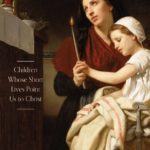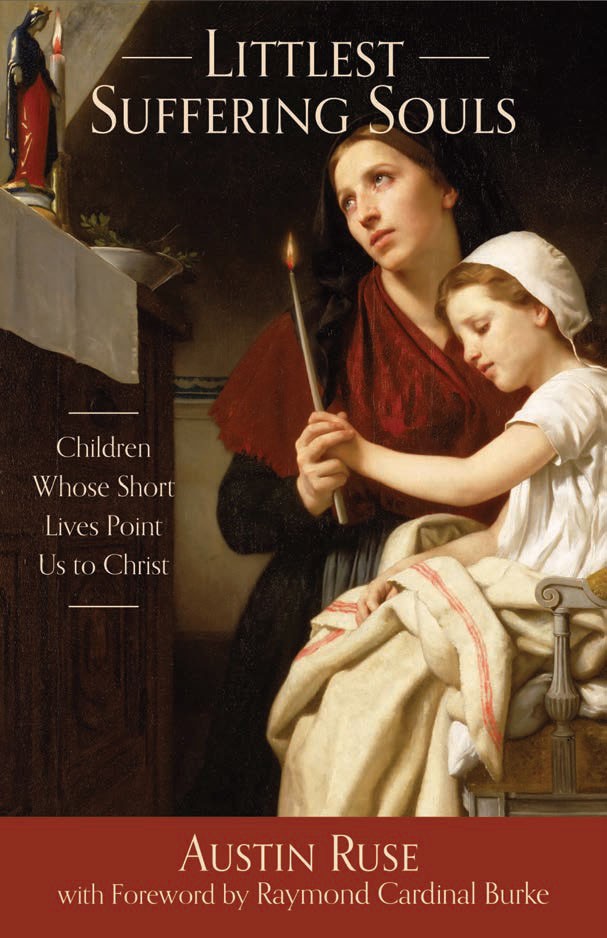 The Littlest Suffering Souls: Children Whose Short Lives Point Us to Christ, by Austin Ruse. Charlotte, NC: Tan Books, 2017. 152 pages.
The Littlest Suffering Souls: Children Whose Short Lives Point Us to Christ, by Austin Ruse. Charlotte, NC: Tan Books, 2017. 152 pages.
“How could a loving God allow the pain and suffering we see every day? And perhaps what is most troubling to many: How could He allow such evil to strike the most innocent among us, the children?” Prominent Catholic writer Austin Ruse gives compelling answers in his recent book The Littlest Suffering Souls: Children Whose Short Lives Point Us to Christ, an examination of three children who heroically endured mercifully brief, suffering-filled lives.
Ruse observes that human obsession with pain is relatively new. “We moderns have unprecedented resources with which to control pain, and so even slight discomfort sends us to the medicine cabinet.” Contrarily, “[a]ncient man had little to no ability to control or reduce pain; therefore, he did not think about it nearly as much as we do. There was nothing to think about.”
Today it “is the problem of pain, suffering, and evil that both keeps many people far from God and the Church,” Ruse notes while citing British atheist actor Stephen Fry. His viral Youtube interview rejected the existence of a God who could allow children to suffer from bone cancer, but he receives a clear rebuttal in Catholic teaching presented by Bishop Robert Barron. As Ruse paraphrases, “we live in a tiny fragment, one tiny sliver of space and time and that it would be the height of arrogance to suggest from this tiny glimpse that we can possibly know the whole story of God’s creation.”
Ruse notes that the secular “world fails to take into account that the purpose of our lives is to know, love, and serve God and to prove our worthiness of eternal happiness with Him in heaven.” “Consider modern irreligious man for whom, other than building bigger muscles, pain is devoid of meaning. To him, pain must be among the greatest of all evils,” while Ruse contrasts detailed Catholic teaching on pain’s redemptive aspects. Joined to the suffering of Christ crucified and His church, “for believers, pain can be a punishment, a lesson, a test or a tool, but at least there is a reason, something to take away, something to ponder or pray about.”
Two of Ruse’s child case studies, Brendan Kelly and Margaret Leo, were born with birth defects in Ruse’s northern Virginia home community. While Brendan had Downs syndrome, Margaret had the
most severe form of spina bifida, essentially a death sentence for most in this day and age. Children so diagnosed these days have virtually no chance of being born. Rather, most are aborted. Doctors, parents, and society in general are in lockstep about that. The argument is that such children are a burden too great to bear….It is a shock to many doctors, and very likely a scandal, that some parents—like the Leos—choose to bring such an unworthy child to term.
Ruse’s searing response notes:
Modern man sees a child with spina bifida—all hunched over in a wheelchair, having to be wheeled everywhere—as a wasted life and, what is worse to his way of thinking, wasted resources. Such a man, if he can be called such, might experience more wonderment at the sight of a robot than in this child of God.
By contrast, Ruse’s poignant portraits of three living child martyrs proves that “their lives are far from useless, even though they would be judged so by many in this age that does not understand the most basic truths about the human person.” These are “children who embraced and lived the Catholic understanding of suffering, and who, through their suffering and their approach to it, brought others to the Church and to Christ and perhaps to heaven itself.” After Brendan succumbed to a grueling battle with leukemia, perhaps over 2,000 people from all over the United States and the world attended his wake; President George W. Bush wrote a private condolence letter to Brendan’s parents. “Not bad for a life many today would say was not worth living,” Ruse observes.
Ruse notes the particular spiritual relevance of his Beltway area child subjects:
They were born into families of influence. Families that inhabited a particular milieu: the power center of Washington, DC. In short, they, too, were born into a kind of spiritual desert, an environment in which the things of the world can so easily take precedence over the things of God. And they had—and still have—lessons to teach the inhabitants of that particular desert.
For Ruse these lessons include forbearance and simplicity, as taught by Margaret with titanium rods placed her back for its straightening, but bent by her spina bifida instead. “Let us always remember those bent titanium rods in Margaret’s back now found on her father’s desk, as they remind him of what a bad day really looks like. Let them remind us.” Likewise, “[s]implicity, transparency, a lack of guile: these are needed in this day and age of suspicion and widespread lack of trust.”
As Cardinal Raymond Burke writes in a forward, Ruse’s book “demonstrates the profound error and evil of the ‘culture of death’” and its warped values. Ruse writes that each of his subjects
in their short lives so full of suffering achieved more than the richest Silicon Valley billionaire who may have done great things and amassed great wealth in the eyes of the world but who has lived for nothing if he lived for anything other than the love of neighbor and the love of God.
As God brings good out of evil, Ruse brings joy out of sorrow with his account of Audrey, a carefree but deeply devout girl in a wealthy French family who lived merely a torment-filled year beyond a sudden leukemia diagnosis. Yet “what a blessed year it was, living constantly in the shadow of death but always in the presence of God, living in a kind of hallowed land somewhere between heaven and earth.” Readers will want to have Ruse’s little book with a big spirit.





Comment by Stephen on February 18, 2020 at 12:04 pm
They talk about climate change yet do not understand how God’s blessing of rain creates locusts as the fruit!